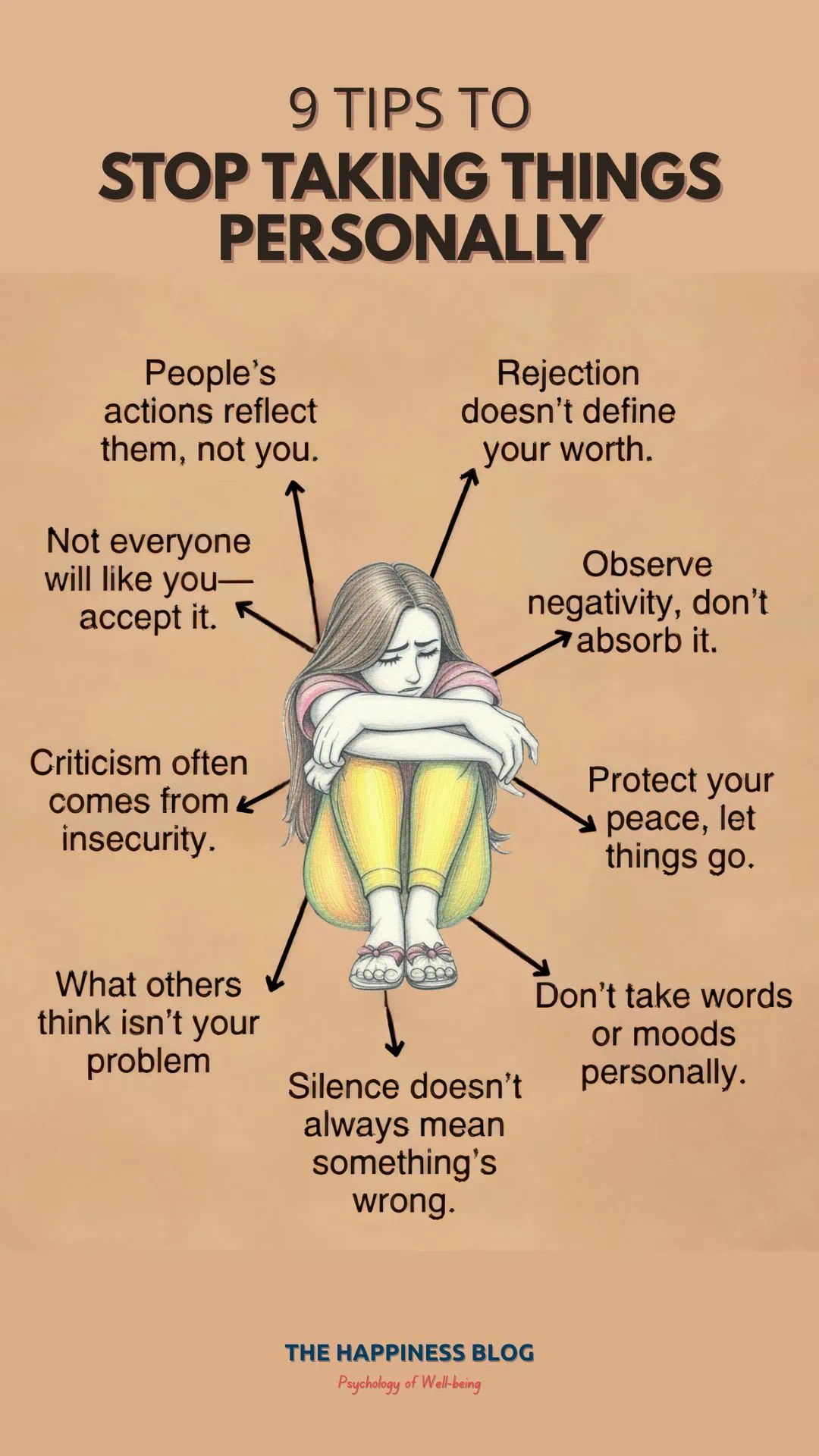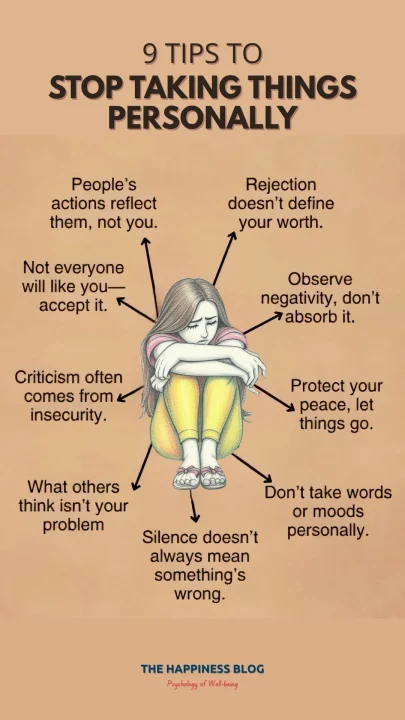Today's Tuesday • 8 mins read
— By Dr. Sandip Roy.
You notice a loose comment, a smug gesture, or a cold shoulder, and you’re suddenly spiraling: “What did I do to warrant that rude behavior?”
That’s called taking things personally. It’s when you get angry or hurt by something someone said or did, even if they did not mean to offend you.
A little truth: If you keep taking every slight personally, you might end up staying offended for the rest of your life.
Some people will always trash you, no matter what. And some others will toss barbs at you to ruin your peace.
These 10 useful tips will help you stop taking everything personally and keep your peace.
1. What Others Think Isn’t Your Problem
Your worth isn’t what other people’s opinions fix.
Whether someone loves you or can’t stand you has more to do with their own experiences, biases, and emotional state than it does with who you actually are.
“Almost always, your actual worth is not what others give you to believe. For all you care, whatever definitions others have fixed for you are vastly dissimilar to, and often the polar opposite of, what you really are.”
Stop worrying about what others think about you. They don’t walk in your shoes or go through the things you do. It’s about reminding yourself that your self-beliefs matter more than their opinions of you.
- Why give so much value to their behavior, thoughts, or opinions about you?
- Why get so anchored to the belief that you are truly good only when people say positive things about you? Or hold nothing negative about you?
When you can look at the world without the filter of handed-down beliefs, you realize you don’t have to take things personally.
Action step: When someone’s opinion bothers you, tell yourself: “This person’s view of me does not change who I actually am. I know who I am.”

2. Rejection Doesn’t Define Your Worth
Rejection is about incompatibility, not much else.
It can happen anywhere, at a job rejection, a relationship ending, or someone ghosting you without an explanation.
“Nobody can say anything about you. Whatever people say is about themselves. But you become very shaky because you are still clinging to a false center.” — Osho
Almost everyone who puts you down is dispensable. You don’t need their approval to live a fulfilling life.
Don’t fake-care if you don’t care. And don’t care when someone fake-cares.
No matter where you are in life, you need a little thick skin to keep criticisms from getting to you. Showing them you don’t care is having that thick skin.
3. Step Away To Maintain Your Peace
The worst thing you could do is snap back with toxicity and negativity. When someone says something hurtful, your mind goes into threat perception mode, and you burst out in anger.
“Between stimulus and response, there is a space. In that space is our power to choose our response. In our response lies our growth and our freedom.” — Viktor Frankl
Create space between their provocative behavior and your knee-jerk response. Take a deep breath, step back, or even leave the scene for a walk. This physical distance helps your rational brain take control again.
Don’t react then and there. You are in control as long as you don’t respond to the words they throw at you. Once you speak in a rush, you lose that power.
If you still want to give them a response, try this non-response:
“I’m not even going to dignify that with a response.”
4. Observe Negativity, Don’t Absorb It.
Practice mindfulness when dealing with negative comments or situations. Instead of letting hurtful words sink in, observe them like clouds passing in the sky.
“Become an observer of the currents of thought that flow through your consciousness. Just like someone sitting by the side of a river watching the river flow by, sit by the side of your mind and watch.” — Osho
Mindfulness helps you recognize that feelings are temporary.
If negative emotions resurface, try some belly breathing to stimulate your vagus nerve and calm your agitation.

5. Don’t Take Words or Moods Personally
People often say things without considering how their words might affect you. It could well be not their intention to hurt you, so why assume malicious intent?
Before jumping to conclusions, ask yourself:
- Are they having a bad day?
- Did I misinterpret their tone?
- Could they be dealing with some stress?
When in doubt, ask. Simple. Get them to clarify rather than assuming the worst.
This research found that older adults were much less likely than younger adults to recognize the presence of anger in faces that were a mix of angry and happy.
6. People’s Actions Reflect Them, Not You
When someone treats you poorly, it’s usually a reflection of their own issues, insecurities, or current emotional state. Everyone is trying to do their best at any given moment to fulfill their own needs.
That person who cut you off in traffic? They might be rushing to the hospital. Your friend who snapped at you? They could be dealing with work stress you know nothing about.
Their behavior is about them, not you.
7. Silence Doesn’t Always Mean Something’s Wrong
Not every quiet moment or delayed response is a personal assault. Sometimes people need space, are busy, or simply don’t have anything to add to the conversation.
Don’t create problems where none exist by reading too much into silence or delayed responses.
8. Criticism Often Comes From Insecurity
People who constantly criticize others are usually dealing with their own insecurities or frustrations. Happy, secure people don’t go around tearing others down.
When someone is overly critical, remember:
- They might be projecting their own fears
- They could be struggling with self-doubt
- Their criticism says more about their character than yours
9. Accept That Not Everyone Will Like You
This is a hard truth, but it’s also incredibly freeing: You will never be everyone’s cup of tea, and that’s perfectly okay.
“Do what you feel in your heart to be right – for you’ll be criticized anyway. You’ll be damned if you do, and damned if you don’t.” — Eleanor Roosevelt
Some people won’t like you because:
- You remind them of someone they dislike
- Your values don’t align with theirs
- They’re simply not compatible with your personality
This doesn’t make you wrong or less valuable. It just makes you human.
10. Let Things Go and Move Forward
Holding onto hurt only gives others continued power over your emotional state. The longer you replay negative interactions, the more damage they cause to your mental health.
“Nobody can hurt me without my permission.” — Mahatma Gandhi
Quick tips for letting go:
- Don’t hold grudges. Forgive, and use your energy for positive pursuits.
- Surround yourself with kind people and set relationship boundaries.
- Forgive yourself. Focus on your goals rather than past failures.
- You don’t owe an emotional debt to anyone who hurts you.
The Real Cost of Taking Things Personally
When you constantly take things personally, you’re essentially giving certain people more power over you than they deserve.
Always taking things personally can:
- Drain your mental and emotional stamina
- Force you to constantly question your self-worth
- Push you toward depression through overthinking
“When we take things personally, we are giving certain individuals more power over us than they deserve or should ever be allowed to have. In effect, you are allowing someone to question what you feel and believe.” — Abigail Brenner
Your Next Steps
Remember: You control how much power you give to other people’s words and actions.
Start small. The next time someone says something that would normally upset you, pause and ask yourself, “Is this about me, or is this about them?”
Most of the time, you’ll realize their behavior has nothing to do with you personally. And once you truly understand that, you’ll find yourself feeling lighter, more confident, and significantly more at peace.
You can’t control what others say or do, but you can always control how you respond. And that’s where your real power lies.
Final Words
You can let insults roll off your back if you think about them as:
- They are speaking meaningless words that don’t apply to me.
- They are hurt people trying to hurt me back in revenge.
- They have a covert plan to hurt my mindset.
Gandhi said:
Nobody can hurt me without my permission.
√ Also Read: How To Handle Criticism Like A Professional?
√ Please share this with someone.
» You deserve happiness! Choosing therapy could be your best decision.
...
• Disclosure: Buying via our links earns us a small commission.
